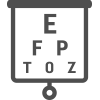Adult Eye Exams
If I’m seeing fine, why do I need an Eye Exam?


Eye Exam and Consultation
During an eye exam, our doctors will ask you questions about any symptoms or issues you are experiencing, medications you are currently taking, any blurry vision, your work environment, and your overall health. Family history and previous eye or vision conditions will also be discussed during this part of the examination. Our doctors will consider this information when determining any treatments or recommendations.





Vision Testing
Regular vision testing and evaluations ensure that you always have the clearest vision possible. Our optometrists provide regular vision acuity test as part of a comprehensive eye exam. Our Optometrists will measure how each eye is seeing by using a wall eye chart and a reading eye chart. The results of these tests are portrayed as a fraction, with 20/20 being the standard for normal distance and reading vision. Depending on the results of your vision test, our Doctors may prescribe corrective glasses, contacts, or eye exercises.





Eye Health
As part of a comprehensive eye exam, our optometrists examine the overall health of the eye through a visual examination and tonometry. Your Optometrist will evaluate eye health by visually inspecting the eye and eyelids using magnification and a bright light. To examine the internal structures of the eye, we may dilate the pupils. Increased eye pressure may be an indicator of glaucoma, so we utilize tonometry to measure eye pressure. After completing these short tests, our doctors review the results and discusses any necessary treatment options with you. Contact us today to schedule a comprehensive eye exam.





Eye Function Testing
In addition to vision testing, an eye exam in our office includes testing eye functionality. Our optometrists perform several tests to evaluate depth perception, color vision, eye muscle capabilities, peripheral vision, and responsiveness to light. Several other simple tests are completed to determine whether the eyes are focusing, moving, and working together properly. The test results enable our doctors to diagnose any underlying conditions that may be impairing the eyes ability to focus or work together.
